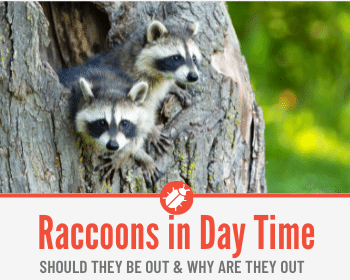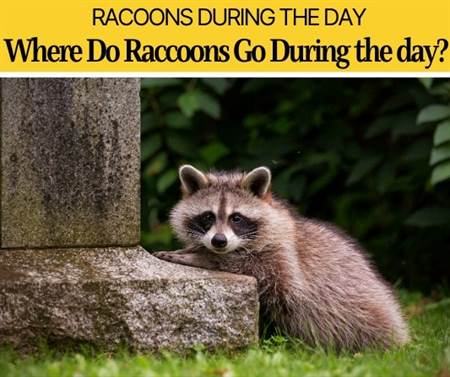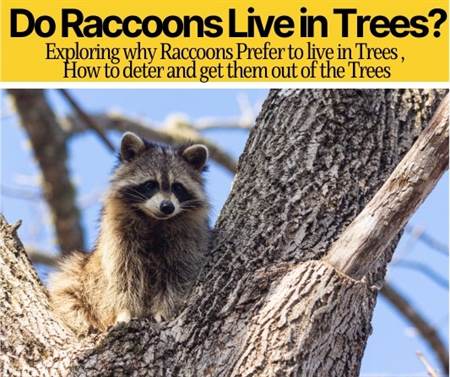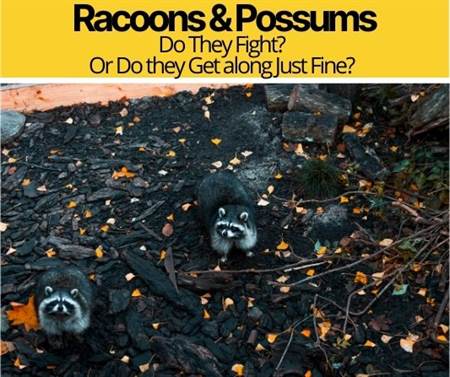
Seeing a Raccoon out during the daylight hours? Wondering if Raccoons should even be out during the day?
In this guide you will learn:
- If raccoons are supposed to come out during the day & Why Do they come out
- What Do Raccoons Do during the Day & Where do they go,
- What to do If you see Raccoon during the day,
- If Raccoons are Nocturnal & other Raccoon Sleep Habits
Do Raccoons Come out During The day?
Yes, raccoons can come out during the day and it is actually quite common for this to happen. While it is true racoons prefer wooded areas, they are very adaptable to various situations and they can survive in many places including neighbourhoods.
They have been reported to take over old sheds, cars, and even abandoned houses.
Raccoons are even known to become pets.
Why do Raccoons come out During the day
A few reasons you may see a racoon out during the day could simply be because:
- They have encountered a food source, either for themselves or their young
With raccoons being opportunist animals, they will essentially feed whenever there is food available to them, meaning even if it is daytime they will still venture out to gather that food source; especially in the winter months where food may be scarce.
- They are dealing with too much competition during nocturnal feeding
Raccoons do prefer to hunt at night, however, they can switch this behaviour for many reasons. If there is too much competition for these nocturnal mammals, they will simply adapt and start hunting in daylight hours.
- Their home was either damaged or discovered
A raccoon’s den, where she keeps her kits, can be destroyed by storms and other predatory animals, including humans. When this happens, she is forced to leave and locate a new home for her and her young, which could be during the daytime.
- It’s a juvenile racoon
Most young raccoons are quite immature and still learning. Unlike the more mature ones that stick to a strict nocturnal lifestyle, these young racoons sometimes prefer a lighter setting as it can help them hunt for food more efficiently and they may come out during the day.
Where do Raccoons go During the day
If the raccoon has already rested or simply wants to forage for food a bit earlier, it will go out for the day.
They normally won’t spend their entire day in the sun due to their eyes not being able to handle it very well, raccoons will spend about a max of three to four hours outside during the day.
Which provides them enough time to enjoy themselves. They can do this in many ways including:
- Hunting for easy prey
- Bathing in the nearby riverbeds
- Searching for a new, comfy den
Also Read: Raccoon Intelligence
Where are Raccoons located During the Day?
While yes it is perfectly okay for raccoons to be outdoors during daylight hours, they most commonly choose to rest in their dens waiting for nightfall to strike.
Raccoons are usually bedded deep within heavily wooded areas, somewhere they can be secure and invisible to predators. The area will normally have local water and a close food source.
Where do Raccoons Sleep During the Day?
As mentioned before, raccoons tend to be opportunist mammals with food, the same can be said with sleeping.
Raccoons prefer larger holes, sometimes within hollowed-out trees or within deep rocks.
They’re often said to change their den every night if they have found something better, or have travelled too far from their previous sleeping spot.
These places could include sheds, cars, and even that old treehouse in the backyard.
They also are known for being a bit pushy, if they cannot find a place to sleep; they will take over other animals’ dens.
What should you do if you see a Raccoon during the day
Now that you understand that it is common for raccoons to be outdoors during daylight hours, and why they could possibly be outside, it’s time to acknowledge what to do if you ever see a raccoon while the sun is out.
The answer is simple: Keep your distance and assess the situation at hand.
If you see a raccoon in your yard, Ammonia or Vinegar can be a great Raccoon Repellent to deter the raccoon from your yard.
As it was previously noted that it is normal behaviour for a raccoon to be outdoors during the day, what usually determines whether a wildlife official needs to be contacted is how the raccoon is behaving.
Spending the time to educate yourself to learn Raccoon’s normal and abnormal behaviours could be potentially life-saving.
Let’s go through the key differences between these two behaviours.
Normal behaviour during the day includes:
- Alertness, it is responsive to its surroundings,
- Non-aggressive attitude towards humans if left alone,
- Moves with a purpose, not seemingly wandering around,
This behaviour could come in many different forms. A healthy raccoon will be alert to all surrounding senses, whether it is touch, sound, or even movement.
If the raccoon is alerted by those senses, it could trigger a flight or fight response as a result of these disruptions, but in most cases a raccoon will keep a lengthy distance away from you, or other larger predators, if they are simply left alone.
If you charge, antagonize, and essentially bother it; it may retaliate as anyone would.
Respect all creatures as you would want to be respected.
Abnormal Behavior Includes:
- Discharge from eyes or mouth, either white, yellow, or brown,
- Looks very sick with continuous panting,
- Falling over, walking erratically or seems paralyzed,
This abnormal behaviour could indicate rabies, which is a virus that infects the central nervous system and could eventually lead to death.
Rabies can be transmitted through the action of biting, so it is advised if you come across a raccoon and notice that it is showing these specific symptoms, get the right kind of help as soon as possible, specifically professional help. It’s easy to mistake foraging for food with walking erratically.
If an affected animal is walking erratically, it will be walking in circles and won’t have the ability to balance on its own legs.
This is why it isbest to call a wildlife official for this kind of job. A wildlife official will be able to correctly determine if the raccoon is affected and needs to be put down.
Sadly, it is necessary to put down affected raccoons as soon as possible. There are a couple reasons why, one being its best to put affected animals out of their misery as quickly as possible as rabies can put the animal through undeniable pain, it is a painful process that affects the brain.
Reason two being, leaving a rabid wild animal with this ferocious disease could potentially endanger nearby animals and even smaller humans.
In this case, with a sick raccoon wandering around, a pet or even a small kid could be attacked and bit. This could result in them potentially being infected with rabies, which results in a stressful hospital trip.
Continue Reading: What to do If you Encounter A Raccoon
Is a Raccoon that is out During the daytime rabid?
Not at all, a raccoon simply just being outside does not indicate sickness; this goes the same for all nocturnal animals.
Unless the animal, or in our case raccoon shows visible signs and symptoms of rabies, just leave it alone and call wildlife officials to handle it professionally.
They will be able to determine if the raccoon needs to be put down. It is not advised to make these professional decisions on your own, as there are a lot of factors pertaining to rabies.
So, should then Raccoons be outside during daylight hours?
Yes of course they should. As not all raccoons are entirely nocturnal, in most cases their eyes are super sensitive to light, resulting in a more nocturnal behaviour.
It is well within their limits to enjoy some fun in the sun if they so choose to, and some will, it is common for juvenile raccoons to prefer hunting trips in the daylight so they can see and hunt their prey easier, whether it is a bird or a trash can.
Are Raccoons Nocturnal?
Yes, raccoons are generally nocturnal, meaning they are most active at night.
Whether it is hunting for food or mating with other raccoons; they spend most of their time under the moon and they commonly sleep during the day, but this may not always be the case, as explained above in previous topics.
Can Raccoons be Diurnal?
Although naturally, raccoons are nocturnal, their surrounding habitats can affect this behaviour.
When they are labelled diurnal, it simply means they are active during the day.
A few situations that could potentially change their nocturnal behaviour to a diurnal behaviour can include:
- More chances to source food in the daylight,
- A tense environment during the night time,
- Simply because they choose to,
If a raccoon mother raises her kits in a tense environment, one example including construction at night, it may trigger her to either move out of the location or switch up hunting times.
In this case hunting during the day would seem safer for both her and her kits. If this is continued, her kits can grow and adapt to this specific situation.
Do Raccoons usually only come out at night?
While it may seem raccoons only come out at night because of certain behaviours, including being nocturnal, solitary, and timid; it’s certainly not true.
Raccoons have the ability to adapt meaning they can venture out during daylight or nighttime hours, it just all depends on the reasons behind it.
What time do Raccoons come out at night?
With those nocturnal behaviours set in place, raccoons tend to come out soon after sunset, which the times for that could differentiate from locations through the US. While it is hard to pinpoint a specific time where raccoons tend to head out from their dens, just remember there are much higher chances of seeing them after the sunsets.
What time of night are Raccoons most active?
Raccoons prefer a dark setting, meaning the sun may set but they may choose to wait for hours to come out. ]This could be because of their sensitive eyes, they can’t handle the light.
Also, raccoons tend to use the nighttime to become slightly invisible to unsuspecting prey, but if there is still reminisce of light, the bird or smaller mammal may notice the preying raccoon; resulting in the hunt being ruined.
Can Raccoons see in the dark?
Yes, raccoons are able to see even in the darkest rooms due to their eyes having the ability to reflect light, allowing them to see clearly into the darkness.
This structure is called Tapetum lucidum, and the visible effect it gives off is called Eyeshine.
This gives them the ultimate night vision power to hunt. This also occurs in deep sea animals, to allow them to hunt in darken areas.
What should you do if you see a Raccoon at night?
Now that you know raccoons hold an amazing superpower, night vision. It would not be very wise to approach one, especially at night.
As it is true that raccoons are normally non aggressive towards humans, if they feel threatened they will attack. With them having the advantage of night vision, it could end badly for you.
The best thing to do when finding yourself in this situation is to avoid any interaction, whether it is sound or approaching the wild animal.
If the raccoon seems to be rabid, keep your distance and contact your local wildlife officials.
They may not be able to come until the morning due to it being after dark, but it will allow them to prepare. Also can allow them to warn people so they can too prepare in regards to their kids, pets, and yards,
Raccoon sleeping habits
As we now know that raccoons are normally nocturnal, but can also choose to be diurnal, how long do they really sleep?
It can vary between each raccoon as they all live different lives, but on average around 13 hours of sleep.
Do they hibernate? …As the days continue to get much colder, raccoons spend their time building up an extra layer of fat and devouring as much food as they possibly can. As most animals hibernate throughout the winter months, raccoons don’t.
They rest in their dens during the coldest days avoiding the elements brewing outside, and are able to sleep for long periods of time, sometimes reaching a month.






